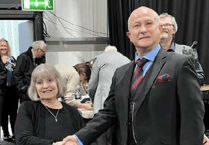AVIAN flu has been confirmed at a premises in Ross-on-Wye, leading to a 3km control zone being set up around the town, restricting owners from moving poultry and other birds.
Another 10km surveillance zone stretching into the Forest of Dean has also been imposed.
The outbreak of the H5N1 strain was confirmed last Thursday (January 20) by the Department for the Environment, Food and Rural Affairs and came after a week of no new cases in the UK, although another has since been confirmed in Cheshire.
All birds at the site, which has been identified as being close to the A40 on the east of the town, will be humanely culled.
It follows another outbreak in a privately-owned flock of geese before Christmas at Highleadon near Hartpury College, which led to the creation of control zones stretching as far as Gorsley, Aston Ingham, Redmarley and Westbury-on-Severn.
As well as a 1.9-mile (3km) protection zone halting bird and egg movements around the site of the Ross outbreak, stretching out towards Weston-under-Penyard, Brampton Abbots, Coughton, Phocle Green and the edge of Bridstow, officials have imposed a 6.2-mile (10km) surveillance zone stretching into the Forest.
The latter includes Mitcheldean, Drybrook, Ruardean, Lydbrook, Kempley, Kilcot, Symonds Yat, Whitchurch, Llangrove, Llangarron, and Much Marcle,
While human cases of bird flu are rare, typically requiring close, prolonged contact with infected animals, there have been a small number of fatal cases globally.
A 79-year-old man from Devon, who kept ducks, was reported to be the first human to contract the virus in Britain last month.
Last week, 26 swans also had to be culled after testing positive at a Windsor rehabilitation centre.
As a result of the nationwide outbreak, which has now seen 70 cases, it has been a legal requirement since November 29 for all bird keepers to keep their birds indoors and to follow strict biosecurity measures in order to limit the spread of the disease.
The 3km protection zone prevents the movement of any birds or eggs within or out of the zone, and residents and businesses are required to notify any poultry on their premises.
The wider 10km surveillance zone tightens restrictions on bird movements.
DEFRA says that wild birds migrating to the UK from Europe can spread the disease to poultry and other captive birds.
People should not touch or pick up any dead or sick birds they find and should report them by calling 03000 200 301.
The rules in the zones also cover the removal of litter, manure and slurry, and other biosecurity measures.
For full guidance, go to assets.publishing.service.gov.uk




